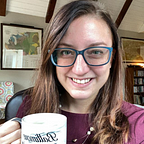Building connections: MOST team touring state following busy spring
Whether providing timely legislative science notes or touring the state for face-to-face gatherings with scientists and legislators, the fellows and staff of the Missouri Science & Technology (MOST) Policy Initiative have built and grown busy, productive connections during the first six months of 2021.
Consider this snapshot of activities:
- In just the first 10 weeks of the recently-completed 101st General Assembly, MOST policy fellows provided more than 50 science notes at the request of legislators.
“Without their support and trust, we would not be able to effectively bring scientific resources into the policymaking process,” MOST Director Rachel Owen, PhD, said in March. She also highlighted that the evenly partisan nature of legislative requests was a strong indicator that MOST is a valuable resource and service for policymakers.
- Now that the pandemic has lightened and vaccines are on the rise, the MOST team is exploring the state of Missouri, meeting with researchers and policymakers working at the science and policy interface.
The MOST team kicked off its summer tour in St. Louis. Then, staff and fellows visited Kansas City and Springfield, and finally convened stakeholders in Central Missouri.
“Throughout the summer, we also plan to visit communities across northern and southern Missouri as well,” Owen said last week. “We hope that these visits will help us better understand the issues and challenges facing the state and that we will build relationships with researchers who will help us to elevate science in policy conversations at the state and local levels.”
The visits put additional action to the MOST mission, vision, and values. The organization’s purpose is “to serve as a boundary spanning organization between science and policy at the state and local levels by providing resources, fostering relationships, and showcasing collaborative solutions.”
In its pursuit of identifying knowledge gaps, MOST Policy Initiative works collaboratively with policymakers and the scientific community to determine priority topics and to identify knowledge gaps.
Owen elaborates on the approach to science notes.
“We do not offer unsolicited advice to lawmakers,” she said. “Rather, we take requests for information from lawmakers through the Missouri Science & Technology Policy Fellows Program.”
When working with scientists, MOST encourages building relationships with elected officials and leaders in order to understand where science can most effectively inform policy discussions.
Now, as the team initiates literal boots-on-the-ground connections across the state, Owen said, “We are touring universities and research labs, visiting with local lawmakers to learn about their districts, and networking with members of the Missouri Local Science Engagement Network.”
The heart of MOST’s policy initiative undertaking is the fellows program. MOST was among the group of science and policy bridging organizations that launched state level science policy fellowship programs in August 2020.
To avoid lobbying and the appearance of lobbying, MOST Policy Initiative follows guidelines outlined by the Missouri Ethics Commission. Those steps include screening fellows for their ability to remain open-minded, objective, and non-partisan. For instance, when fellows begin their work with the state legislature, they sign a code of conduct to serve as independent science advisors absent of personal political views.
As MOST Policy Initiative and the Local Science Engagement Network looks to the future and a busy summer, learn more about the fellows program and the vital role fellows play in the organization with these resources:
- Fellows summarize Missouri policy progress.
- Interdisciplinary collaboration helps bridge science with policy.
